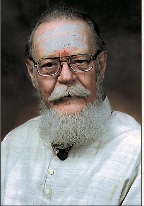By Devananda Tandavan
BPH stands for Benign Prostatic Hyperplasia, or enlargement of the prostate, a small, walnut-sized gland found in men at the base of the bladder. Encircling the urethra, it supplies the seminal fluid that transports sperm from the testes to the outside. In most men 40-50 years of age (sometimes beginning as early as 30) there is evidence of hyperplasia (enlargement) of the gland’s inner portion. The urethra is then encroached upon, causing difficulty with frequency and urgency of urination, distension of the bladder and discomfort such as backache due to the increased intraurinary tract pressure of the retained urine. The major symptom is an inability to properly empty the bladder, a feeling that there is always some retained urine. The sphincter, a muscle controlling urinary retention, seems to be spastic and does not relax enough to allow normal urination. In the condition’s early stages, sitting in a tub of hot water (Sitz Bath) will relax the sphincter somewhat, and urination should be attempted while in the bath. One of the complications of this condition, when untreated, is a backing up of urine into the kidneys, thus preventing proper urine production and possible deterioration of the kidney tissues. This leads to nonflow of urine and probable infection of the tract. Much kidney damage may be the result of this condition, which may necessitate emergency surgery. Irreparable damage to the kidneys may lead to death.
Medical science is not entirely clear about this condition’s cause. Many believe it is due to a loss of testosterone level (and subsequent increase in estrogen level) that stimulates hyperplasia of the gland’s central portion. Some also claim it may be due to sagging of the abdominal organs due to inactivity of more mature males. There also may be a dietary contribution of low levels of zinc, vitamin C, E and other antioxidants.
Several suggested surgical procedures should only be utilized if the disease process has become uncontrollable. Two prescription medications also available–but not suggested–are Proscar and Hytrin. Both may cause impotence, ejaculatory dysfunction or possible birth defects in male offspring. They are not very effective in reducing the swelling.
Saw palmetto and pygeum are two effective herbs with no side effects. Dr. Julian Whitaket says in his Sept., 1993, newsletter, “The saw palmetto berry extract has been shown by scientific studies to be about three times more effective than the Merck drug Proscar for alleviating symptoms of prostate enlargement, such as poor urinary stream, urine retention and nighttime urination.” Pygeum has been used for centuries in Africa for all kinds of urinary tract problems in men. Combinations of saw palmetto, pygeum, zinc and other natural substances are available and recommended for prevention of disease in general as well as treatment of this condition. Taking the combination starting at age 45 and continuing in controlled doses past age 70 is advisable. Dietary advice is to eat plenty of tomatoes, tofu and other soy products, nuts and grains, leafy green vegetables and yogurt. A good exercise program to keep abdominal muscle integrity is essential. There is no connection between this abnormality and malignant tumor of the prostate, the most common cancer in men.
Dr. Tandavan, 77, retired nuclear physician and hospital staff president, lives in Chicago, where he specializes in alternative healing arts. Visit his home page at the Hinduism Today Website.


